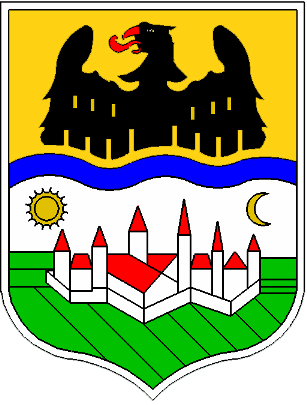Reception Hall Information
Calendar of Events
Photographs
Membership Dues
Labor Day 2017
The Donauschwaben Coat of Arms
 The Donauschwaben coat of arms was created by Hans Diplich in 1950. Gold and white are separated by a wavy blue chevron; the upper area has a black eagle spiced with red; below is a white fortress with six towers and red-roofed buildings on green arable soil, above which float the shining golden sun on the right and the white waning moon on the left. The left and right are described – as is customary in heraldry – not from the viewpoint of the observer, but rather from the viewpoint of a knight on horseback.
The Donauschwaben coat of arms was created by Hans Diplich in 1950. Gold and white are separated by a wavy blue chevron; the upper area has a black eagle spiced with red; below is a white fortress with six towers and red-roofed buildings on green arable soil, above which float the shining golden sun on the right and the white waning moon on the left. The left and right are described – as is customary in heraldry – not from the viewpoint of the observer, but rather from the viewpoint of a knight on horseback.
The coat of arms shows Germany’s national colors – black, red, and gold – and the Donauschwaben ethnic colors – green and white. Black, red, and gold – the symbol of German unification as well as colors of the German league – are incorporated into the coat of arms because Donauschwaben history developed within the framework of the Holy Roman Empire of the German Nation until 1806. White is the symbol for the peaceful sentiments of the Donauschwaben; green represents hope and the new fields of their homeland which were cultivated to become an important grain region.
The imperial black eagle holds his wings protectively over the Pannonian countryside (Roman province) in the central region of the Danube and symbolizes the obligation of the Holy Roman Emperor to protect those borders of the empire. The wavy blue line symbolizes the Danube River, on or along which the German settlers traveled to Hungary. Amidst fertile farmland stands the strong fortress of Temeschburg (Timisoara), flanked to the left by the waning Islamic crescent moon and to the right by the bright rising sun, the symbol of Christ, who is the true light of the world. The six towers of the fortress represent the six main regions of the settlement for the Donauschwaben: Central Hungarian Highlands, Swabian Turkey, Slavonia-Syrmia, Batschka, Banat, and Sathmar.
The inscription at the bottom reads “Für immer frei und ungeteilt” or “Always free and undivided.” This motto refers to the fact that the Donauschwaben people were once free in one undivided land, which they will always long for but, as a result of both World Wars, will always be just a dream.